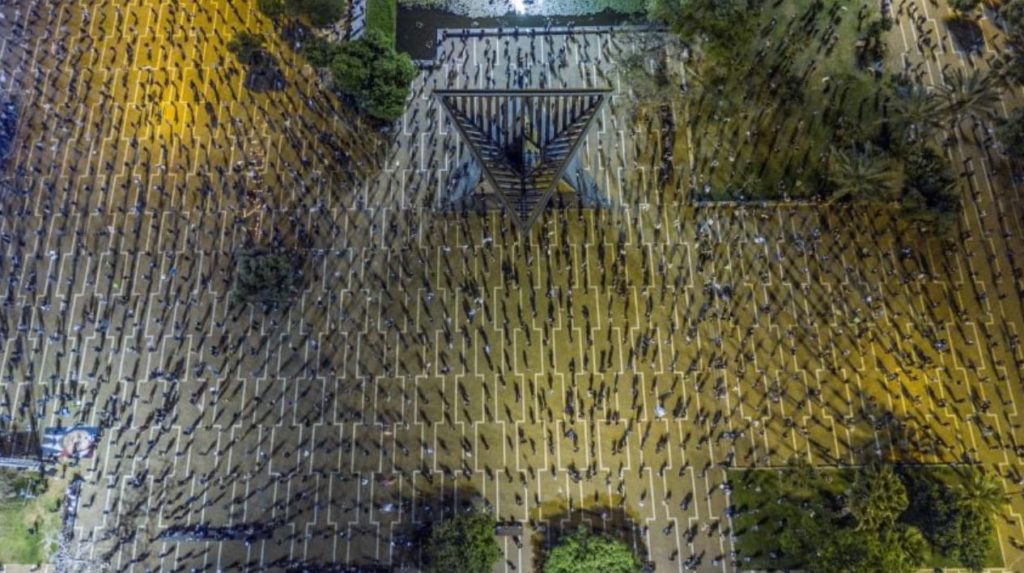 By John Vibes
By John Vibes
Over the weekend more than 2,000 Israelis gathered in Tel Aviv’s Rabin Square to protest surveillance measures that the government, led by Prime Minister Benjamin Netanyahu, has implemented in response to the coronavirus pandemic.
The demonstrators seemed to take the threat of the virus seriously despite gathering outside, because the organizers required everyone to wear masks and had them spaced out several feet apart.
The embattled Prime Minister was the primary target of the protests. Not only is he implementing unpopular measures that Israelis fear could be permanent, but much of the country does not recognize him as a legitimate leader. Netanyahu was scheduled to face trial for corruption charges on March 17th, but his hearing was postponed because of the pandemic.
Netanyahu failed to win reelection in the Israeli elections after his third try, on March 2, but has continued to rule the country using emergency powers. Critics of the Prime Minister have suggested that he is using the pandemic as an excuse to stay in office and extend the power of the central government.
In an interview with The Daily Beast last month, historian Gershom Goremberg said that the Prime Minister was “using the crisis to postpone his own trial.”
“The prime minister and the Knesset speaker are using the health crisis to evade the outcome of the election and remain in power despite the fact that a majority voted to remove them from power. These are pretty serious challenges to basic democratic order. It feels like the combination of a global health crisis, and the negative electoral results, from Netanyahu’s point of view, not to mention his upcoming trial, have pushed Netanyahu and his cronies to lose all inhibitions about undermining the democratic process,” Goremberg said.
In response to the draconian measures, which includes invasive cellphone tracking, thousands of citizens have taken to the streets in protest. The demonstration looked even bigger than it actually was because of the distancing measures, since people were spread apart and taking up a larger area in the street.
Tamir Hefetz, one of the protest organizers, feels that he has no choice but to protest the current administration and its recent actions.
“It started with the coronavirus, when they [the government] started passing anti-democratic bills. I woke up and realized there is no alternative, tomorrow will be too late,” Hefetz told Haaretz.
Many of the protesters were also calling for unity and peace between Israelis and Arabs.
Ayman Odeh an Israeli Arab lawyer and politician, and Chairman of The Joint List said, “Given our shared fate, we are fighting the cruel coronavirus epidemic – Arab and Jewish doctors, caretakers and pharmacists. We will continue fighting and we will beat it. This shared fate is meant to continue through all the issues that are dear to us: Peace, democracy, equality and social justice.”
“It’s not easy for me to stand among some of the speakers here tonight, but we need to see the main point – only through a joint Jewish-Arab struggle can we succeed. This crisis presents a huge opportunity for a wide Jewish-Arab front for peace and democracy,” he added.
Former Defense Minister and Telem Chairman Moshe Ya’alon agreed, adding that “Fighting on the field are devoted medical teams in hospitals and clinics, social workers and yes, among them many Arabs, who are saving us despite our failed leadership.”
Interior Minister Gilad Erdan reportedly called for increased police enforcement to limit the protests, but the move was rejected by Prime Minister Benjamin Netanyahu who feared that a further crackdown could backfire and make the administration look even worse.
By John Vibes | Creative Commons | TheMindUnleashed.com
Subscribe to Activist Post for truth, peace, and freedom news. Become an Activist Post Patron for as little as $1 per month at Patreon. Follow us on SoMee, Flote, Minds, Twitter, and HIVE.
Provide, Protect and Profit from what’s coming! Get a free issue of Counter Markets today.
Thousands of Israelis Protest Emergency Powers While Maintaining Social Distancing